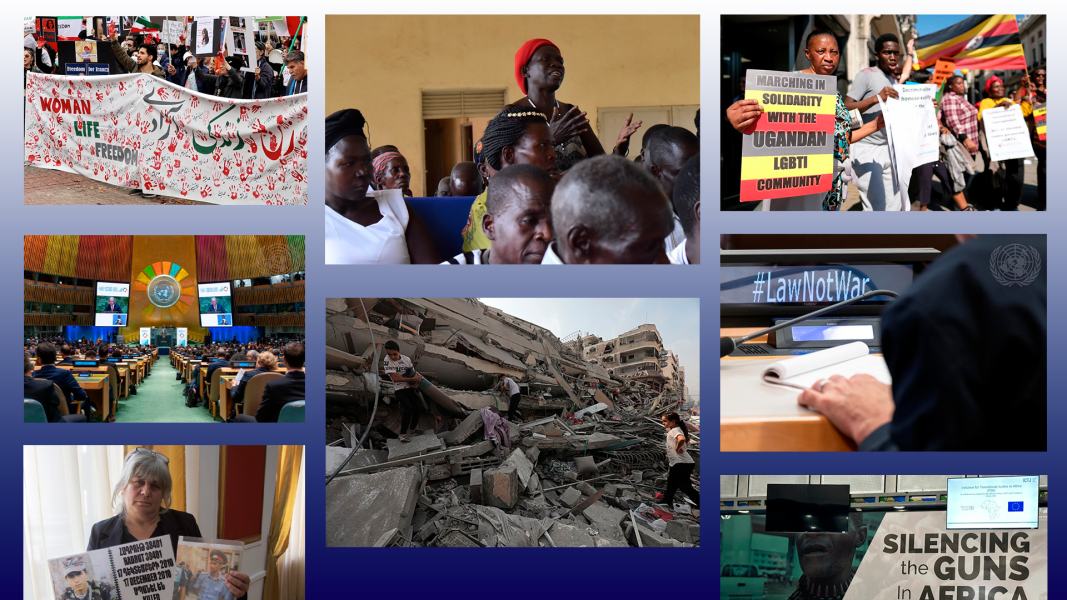Throughout 2023, ICTJ’s experts have offered their unique perspective on breaking news around the globe as part of the World Report. Their insightful commentaries have brought into focus the impact these events have on victims of human right violations as well as larger struggles for peace and justice. In this edition, we look back on the past year through the Expert’s Choice column.
Early in the year, Senior Expert Cristián Correa considered recent agreements in Venezuela, in which both the government and the opposition committed to take concrete steps to strengthen good governance and human rights. These agreements, while narrow in scope, have offered a measure of hope for a more democratic future. In the spring, Researcher and Project Coordinator Veronika Hoelker and Researcher Naryi Vargas explored Colombian President Gustavo Petro’s plan for “Total Peace” in the country and the myriad obstacles it faces, including limited cooperation from the remaining armed groups. Despite the challenges, Petro has stood in a unique position to harness the momentum for change ushered in by his historic presidential win. And in the fall, Program Coordinator Maria Abrahamyan reflected on the state of Armenia’s transitional justice agenda five years on—amidst renewed conflict with Azerbaijan and in light of setbacks to democratic reforms and justice.
Our experts provided their point of view on the conflicts in Ukraine and Gaza and the need for a victim-centered justice. Deputy Executive Director and Director of Programs Anna Myriam Roccatello and Executive Director Fernando Travesí assessed the Council of Europe’s recent resolution to create an international register of damages caused by Russian aggression in Ukraine, while stressing the importance of involving the victims in the process. With the brutal war in Gaza raging on and humanitarian crisis in the enclave ever worsening, Fernando Travesí pondered the UN Secretary-General’s October 15 statement and called for an immediate ceasefire, unhindered access to humanitarian aid, and the unconditional release of the hostages.
In the area of gender justice, our experts celebrated women’s contributions to justice, while scrutinizing recent setbacks in different corners of the world. Senior Expert Kelli Muddell marked International Women’s Day with a powerful reminder that women’s access to economic, political, and social resources is fundamental to creating and maintaining a stable democratic society. The events in Iran over the past year, she argued, demonstrate that women’s bodies are often at the center of repression and conflict and that women are often the first to put their lives on the line to demand change. Program Associate Marianne Akumu later commemorated the International Day for the Elimination of Sexual Violence in Conflict by highlighting the progress Uganda has made to prevent the recurrence of conflict-related sexual violence and its contributions to the jurisprudence on sexual and gender-based crimes. This past year, the Ugandan Parliament also passed the Anti-Homosexuality Bill—the harshest anti-LGBTQ+ law on earth. Anna Myriam Roccatello explored the historical origins of the discriminatory law and the impact it will have on the lives of LGBTQ+ individuals.
Finally, our experts helped us make sense of major developments in transitional justice at the international and regional policy levels. In the summer, Senior Expert Howard Varney reflected on the Rome’s Statute’s 25th anniversary, the International Criminal Court’s track record thus far, and its unrealized full potential. In September, the UN held the Sustainable Development Goals Summit in September. Senior Expert of Research Roger Duthie helped to unpack the summit’s outcomes, explaining why the Sustainable Development Goals are considered to be “in peril” and how a more victim-centered approach can make a difference. Lastly, Head of Office in Brussels and The Hague Santa Falasca covered the official launch of the Initiative for Transitional Justice in Africa in late October. The joint African Union-European Union initiative, she said, promises to invigorate efforts for peace and justice on the African continent.
As turbulent as 2023 was for peace and justice, the year ahead undoubtedly has new challenges in store. We at ICTJ will continue to monitor news around the world for the latest in transitional justice. Please make sure you have signed up for our newsletters and be the first to receive our monthly World Report and Expert’s Choice.
